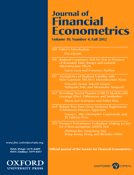
Journal of Financial Econometrics
metrics 2024
Advancing the frontiers of financial insights.
Introduction
Journal of Financial Econometrics, published by Oxford University Press, stands as a leading academic journal in the fields of financial economics and econometrics. With an impressive impact factor and a ranking in the Q1 quartile for both Economics and Finance categories in 2023, this journal is recognized for its contribution to advancing theoretical and applied methodologies in financial econometric analysis. It publishes high-quality research that addresses critical issues in finance, aiming to foster a deeper understanding of the economic factors influencing financial markets and instruments. Researchers and practitioners alike benefit from its rigorous peer-reviewed articles, which are invaluable resources for both academic scholars and finance professionals. The journal’s content typically spans pioneering techniques in econometric modeling, empirical analysis of financial instruments, and innovative applications of econometric theory in real-world scenarios. Operating out of the United Kingdom, the journal continues to serve as a vital platform for disseminating significant research findings from 2005 to 2024, ensuring that the latest advancements in the field are accessible to its audience.
Metrics 2024
 2.01
2.01 1.80
1.80 4.00
4.00 50
50Metrics History
Rank 2024
Scopus
IF (Web Of Science)
JCI (Web Of Science)
Quartile History
Similar Journals
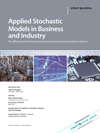
APPLIED STOCHASTIC MODELS IN BUSINESS AND INDUSTRY
Fostering Excellence in Business and Industry Through ModelingApplied Stochastic Models in Business and Industry, published by Wiley, is a preeminent journal dedicated to advancing the field of stochastic modeling in various business and industry contexts. With an ISSN of 1524-1904 and an E-ISSN of 1526-4025, this journal serves as a vital platform for researchers and practitioners aiming to leverage stochastic techniques to address complex decision-making and operational challenges. The journal holds prestigious rankings, including Q2 in Business, Management and Accounting, and has converged years spanning from 1999 to 2024. It is distinguished by its wide scope, focusing on all aspects of modeling and simulation, as well as decision sciences and operations research. Although it does not operate as an open-access journal, its significant impact factor and Scopus rankings ensure that the valuable insights published within reach a broad audience. By fostering high-quality research and discourse, Applied Stochastic Models in Business and Industry plays a crucial role in driving innovation and excellence in its fields.
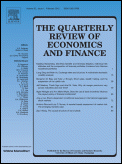
QUARTERLY REVIEW OF ECONOMICS AND FINANCE
Exploring Innovative Insights in Finance and EconomicsQuarterly Review of Economics and Finance is a renowned academic journal published by Elsevier Science Inc. that focuses on key advancements in the fields of economics, econometrics, and finance. With a commitment to fostering scholarly dialogue, this journal provides a platform for researchers and practitioners alike to disseminate innovative ideas and empirical research, contributing to the economic discourse since its inception in 1992. Recognized for its quality, the journal holds an impressive Q2 ranking in both Economics and Econometrics and Finance, with Scopus rankings placing it in the 81st percentile, underscoring its relevance and impact within the scholarly community. While the journal operates under a subscription model, it boasts a global readership and is accessible to professionals and students seeking insightful and rigorous analyses of contemporary economic issues. With its clear objectives of expanding knowledge and influencing practice, the Quarterly Review of Economics and Finance serves as an essential resource for anyone committed to understanding the dynamics of economics and finance in the modern world.
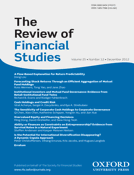
REVIEW OF FINANCIAL STUDIES
Advancing the Frontier of Financial KnowledgeREVIEW OF FINANCIAL STUDIES, published by Oxford University Press Inc, stands as a premier academic journal in the realms of accounting, economics, and finance. With an impressive Impact Factor that reflects its high citation rates and broad influence, this journal, with an ISSN of 0893-9454 and E-ISSN 1465-7368, is considered a cornerstone for researchers, academics, and professionals seeking to contribute to and stay updated on groundbreaking developments in financial studies. Since its inception in 1996, it has established a robust reputation, consistently ranking in the Q1 category across multiple disciplines, highlighting its elite status in the global academic landscape. The Scopus rankings further reinforce its importance, positioning it at the forefront of business, economics, and finance research. While the journal is not open access, it offers vital insights and comprehensive studies that foster a deeper understanding of contemporary financial issues and methodologies. Located in the United Kingdom, the REVIEW OF FINANCIAL STUDIES is an essential resource for those aiming to advance their knowledge and research in this dynamic field.

Pacific-Basin Finance Journal
Navigating Economic Dynamics in the Pacific RegionPacific-Basin Finance Journal is a prestigious academic journal that focuses on critical developments and innovative research within the fields of finance and economics, specifically tailored to the Pacific region's unique economic landscape. Published by Elsevier, the journal boasts an impressive impact factor and is categorized in the Q1 quartile for both Economics and Econometrics and Finance as of 2023. This indicates its high relevance and position among the top journals in its field, with Scopus rankings reflecting a strong standing in the competitive landscape of finance research, holding the 45th position out of 317 in Finance and the 108th in Econometrics. Established in 1993, the journal is committed to disseminating rigorous theoretical and empirical research findings that enhance the understanding of financial systems in the Pacific Basin. Although the journal is not open access, it provides invaluable insights and comprehensive studies aimed at professionals, researchers, and students alike, fostering a deeper comprehension of the region's economic dynamics and global interconnectedness.

European Journal of Finance
Connecting theory with practice in the world of finance.European Journal of Finance is a prestigious publication specializing in the domains of finance, economics, and econometrics, published by Routledge Journals, Taylor & Francis Ltd. Established in 1995, this journal has become a vital resource for researchers, practitioners, and students, contributing significantly to the understanding of financial systems and markets. With its Q1 ranking in the Economics, Econometrics and Finance category, it stands out for its rigorous peer-reviewed articles that explore innovative theories, models, and empirical studies. The journal's impressive Scopus ranking of 35 out of 242 highlights its impact and relevance within the field, with an 85th percentile standing that underscores its importance to current financial research. Although it does not offer open access, the European Journal of Finance remains a cornerstone for those seeking to delve deeper into the complexities of finance, equipped with insights that drive both academic inquiry and practical application.
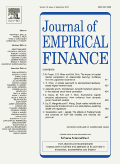
Journal of Empirical Finance
Exploring the empirical foundations of global economies.Journal of Empirical Finance, published by Elsevier, stands as a key resource in the areas of finance and economics, with a definitive focus on empirical studies. As a prominent journal since its inception in 1993, it has made significant strides in contributing to the academic community, evidenced by its soaring categorization in Q1 for Finance and Q2 for Economics and Econometrics as of 2023. With an ISSN of 0927-5398 and an E-ISSN of 1879-1727, the journal emphasizes robust, data-driven analysis to inform both theoretical and practical aspects of financial research. While access options do not include open access, the journal ensures that its content remains accessible to a diverse audience of researchers, professionals, and students. It fosters a platform for innovative research and discourse, significantly impacting the fields of finance, economics, and econometrics. The Scopus rankings further bolster its reputation, placing it in the 61st percentile in both categories, reflecting a commitment to high-quality research output. As the journal continues to evolve, it invites contributions that push the boundaries of empirical finance, enabling a deeper understanding of financial mechanisms that drive global economies.

JOURNAL OF FINANCIAL SERVICES RESEARCH
Innovating insights for a changing financial landscape.The JOURNAL OF FINANCIAL SERVICES RESEARCH, published by SPRINGER, serves as a critical platform for scholarly discourse in the fields of finance, accounting, and econometrics. With a dedicated focus on innovative research and rigorous analysis, this journal has maintained a respectable Impact Factor, placing it in the Q2 category for 2023 across multiple academic disciplines including Accounting, Economics, and Finance. Since its inception in 1987, it has contributed significantly to the advancement of knowledge and practice within financial services, making it essential reading for researchers, professionals, and students alike. The journal is based in the Netherlands and hosts contributions that address contemporary issues in financial systems, markets, and institutions. Despite its non-open access format, the journal remains highly relevant, with Scopus rankings indicating its solid position within its peer group, especially in the realms of Economics, Econometrics, and Finance. As the journal approaches its converged coverage through 2024, it aims not only to disseminate high-quality research but also to foster a deeper understanding of the dynamic financial landscape.
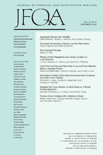
JOURNAL OF FINANCIAL AND QUANTITATIVE ANALYSIS
Fostering Rigorous Discussions in Finance and EconomicsJOURNAL OF FINANCIAL AND QUANTITATIVE ANALYSIS, published by Cambridge University Press, is a premier peer-reviewed journal that has been at the forefront of the finance and economics fields since its inception in 1966. With a notable impact factor reflecting its Q1 status in Accounting, Economics and Econometrics, and Finance for 2023, the journal is recognized for its substantial contributions to both theoretical and empirical research. Researchers and practitioners alike benefit from its comprehensive scope, addressing critical issues in financial analysis and quantitative methods. Although the journal does not currently offer open access, it remains widely accessible through institutional subscriptions. The editorial team is committed to fostering rigorous academic discussions that shape the future of finance and economics, making it an essential resource for academics, students, and industry professionals seeking to deepen their understanding of these vital disciplines. For more than five decades, this journal has continued to be an indispensable platform for disseminating influential research, thus solidifying its role as an essential cornerstone in the financial and quantitative analysis community.
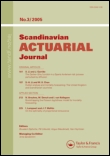
Scandinavian Actuarial Journal
Pioneering research at the intersection of economics and actuarial science.The Scandinavian Actuarial Journal, published by Taylor & Francis Ltd, stands as a pivotal resource in the fields of Economics, Econometrics, Statistics, and Probability, with a legacy dating back to 1918. This esteemed journal, headquartered in the United Kingdom, offers valuable insights and comprehensive research findings that contribute significantly to the actuarial and statistical communities. With its impressive 2023 quartile rankings—Q1 in both Statistics and Probability, and in Statistics, Probability and Uncertainty, as well as Q2 in Economics and Econometrics—this journal is recognized for its high-quality peer-reviewed content, making it indispensable for researchers, professionals, and students alike. Although it currently does not operate under an Open Access model, the journal ensures rigorous academic standards and broad visibility within its field. With a Scopus rank placing it in the top quartile of relevant categories, the Scandinavian Actuarial Journal is committed to advancing knowledge and fostering innovation in statistical methodologies and insights.
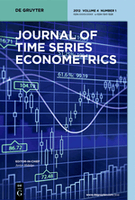
Journal of Time Series Econometrics
Elevating Econometric Practices Through Timely ResearchJournal of Time Series Econometrics, published by WALTER DE GRUYTER GMBH, serves as a pivotal platform for current research within the fields of Economics and Econometrics. With an ISSN of 2194-6507 and E-ISSN 1941-1928, this journal is dedicated to the advancement of time series analysis techniques and their practical application in economic contexts. Operating from Germany, the journal seeks to foster a vibrant intellectual environment, inviting contributions that push the boundaries of established theories and methodologies. With an established influence in academia, recent evaluations have placed the journal within the Q4 category in the 2023 rankings for Economics and Econometrics, alongside a notable 39th percentile ranking in Scopus. Although currently lacking open access options, the journal promotes crucial discussions and knowledge dissemination on innovative econometric practices. The period from 2016 to 2024 marks a significant phase of convergence in the journal's evolution, promising ongoing relevance and engagement for researchers, professionals, and students eager to explore the complexities of time series analysis and its implications within economic theory.